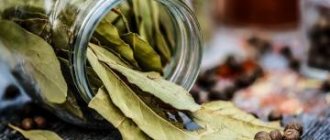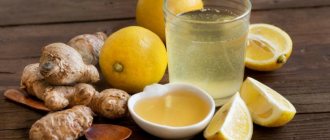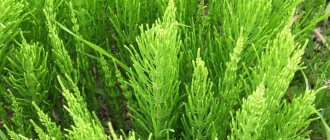Alexandria leaf, also known as senna or cassia leaves, is a medicinal plant most often used as a laxative.
It belongs to the subshrub species, the genus Senna, and the legume family. The height of the plant does not exceed one meter. The erect stem bears complex, pinnate leaves. The flowers are usually large, irregular, collected in a racemose inflorescence. Their characteristic color is yellow. The fruits are dark brown beans with many seeds.
Wild senna leaves grow in dry areas. The plant is heat-loving and dies in light frosts. It is most common in the deserts of Asia and Africa, but in Russia it is grown artificially.
After collection, the leaves are dried in air or in special devices, from which the color of the leaves becomes grayish-green or light green with yellowish or brown inclusions.
Properties
Most often, bush leaves are used to make raw materials. But there are many recipes where you need to use only fruits. Alexandria leaf has quite varied properties. It has a positive effect on the functioning of the large intestine. This remedy is a fairly good laxative and also a choleretic agent.
Helps with diseases such as:
- haemorrhoids;
- acute conjunctivitis;
- various skin diseases;
- gallbladder diseases;
- for liver problems.
Contraindications
Her medications affect potassium metabolism and people taking heart medications need to remember this.
Senna is contraindicated in people allergic to anthraquinones. Such allergies are very rare and are usually limited to dermatological reactions in the form of redness and itching.
In case of overdose, taking senna and its preparations can provoke not only pain in the intestines, but also nausea and vomiting.
But there are a number of diseases for which this drug is contraindicated, in particular intestinal obstruction, acute intestinal inflammation (for example, Crohn's disease), ulcerative colitis. For any abdominal pain of unknown origin, it is better to refrain from taking senna. In addition, senna is contraindicated during pregnancy, due to the fact that it can cause miscarriage, and a number of authors indicate a mutagenic effect. In addition, when nursing mothers take senna preparations, the presence of active substances is detected in milk, which makes it undesirable during this period of life.
Currently, there are many drugs based on the active ingredients of senna. Unlike raw materials, they are strictly standardized in terms of active ingredients and therefore there will be no problems with choosing the correct dosage.
In ethnomedicine, senna is used for very different diseases: for helminthic infestations, as a cleanser for the body, to remove toxins. It has been established that senna anthraquinones suppress staphylococcus and Escherichia coli.
Photo: Rita Brilliantova
No one has created a topic yet
Koleria was one of our grandmothers’ favorite plants, and then it was undeservedly forgotten. Now there is a new surge in the population.
The Munich Botanical Garden is beautiful at any time of the year, blooms and smells, surprises and delights. Today let's go inside and take a look.
Methods of use
The above tool can be used in the following variations:
- decoction;
- infusions;
- pills;
- powders.
In the fight against excess body weight, as well as against toxins and fecal deposits, the Alexandrian leaf helps tremendously. Tea made from it is best suited to achieve these goals. It contains a large number of different active substances that give the drink laxative and antiseptic properties.
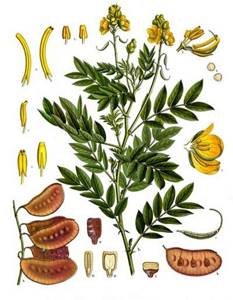
You need to know that consuming Alexandria leaf will not harm the human body. The process of losing body weight occurs due to the fact that intestinal function is stabilized.
Senna herb - benefits and harms, use for constipation, for weight loss
Senna is a plant from the legume family, widely used in medicine. It has several names: cassia holly, African senna, Alexandrian leaf.
The plant is a tropical shrub. The medicinal raw materials are the leaves and fruits of senna. It is grown and harvested on an industrial scale in Asia and Africa.
It also grows in Russia - the climate of the Krasnodar Territory suits it.
The main and most pronounced pharmacological property of senna herb is a laxative.
General information
The effect of this natural remedy on the human body was described by Arabian healers many centuries ago. Today, senna leaf extract is included in a number of laxative preparations.
The population of tropical countries where this shrub grows collects both wild and cultivated cassia several times throughout the summer. For medicinal purposes, both the leaves of the bushes and the ripe fruits, which look like flattened pods, are used.
Composition and medicinal properties of the herb
The plant contains:
- glycosides;
- flavonoids;
- organic acids;
- vegetable resins;
- plant alkaloids;
- anthraquinones (they are the ones that have a laxative effect).
Biologically active substances provide the following pharmacological effects:
- pronounced laxative;
- moderate diuretic;
- secretory;
- appetite stimulant;
- anti-inflammatory.
Indications for use of senna herb
Senna herb and preparations prepared from it are used in the following cases:
Retention of stool, constipation
Plant glycosides normalize the peristalsis of the intestinal wall, resulting in its emptying naturally. This medicine helps with constipation of atonic and hypotonic origin.
From the mechanism of action it follows that the use of senna for constipation of spastic origin should be used with caution or completely avoided
Diseases whose specific nature requires softening of stool
This effect is required for exacerbation of hemorrhoids, as well as for rectal fissures. This action is also relevant in the postoperative period after surgical interventions in the pelvic floor area.
Diseases of the liver and biliary tract
For diseases of the hepatobiliary system, senna’s ability to cleanse the body of waste and toxins and normalize the functioning of hepatocytes and the gallbladder is used. It must be taken into account that senna extract brings benefits for the liver and digestion in low quantities - in contrast to large doses, which have a laxative effect
We recommend reading: Kuril tea - what is useful, how to brew
Weight loss
The instructions for use for senna herb, as well as for preparations containing this medicinal raw material, do not contain information about whether this drug is intended for weight loss and weight loss.
However, this result is achieved thanks to the pronounced laxative effect of the drug, cleansing the intestines and the subsequent cleansing of the body.
The ability of senna extracts to normalize appetite and accelerate metabolic processes also indirectly contributes to weight loss.
For weight loss, senna grass is used together with dandelion, mint, nettle, parsley, and dill as part of herbal preparations. Mixtures of Alexandria leaf with dried fruits and honey are also used.
It must be taken into account that prolonged use of products prepared from this medicinal plant material can lead to addiction.
Before using the herb of Alexandria leaf, consultation with a therapist and nutritionist is necessary.
Use during pregnancy for bowel movements on the eve of childbirth
Information contained in different sources varies. Some mention that with frequent constipation in pregnant women, preparations based on senna relieve the condition. Others focus on the fact that, by causing increased intestinal motility, senna can provoke contraction of the uterine muscles, which will lead to premature birth.
In addition, the excessive loss of fluid that occurs when using senna is harmful during pregnancy. Therefore, the prescription of this herbal remedy to expectant mothers should be carried out on an individual basis after a detailed consideration of all the pros and cons of such treatment
Skin and hair care
Biologically active substances contained in the Alexandria leaf have the property of softening the skin and hair, as well as protecting them from exposure to direct sunlight.
There is information that in countries where the Alexandrine leaf grows, the medicinal properties of its extract are used as an anti-inflammatory agent for purulent skin lesions, as well as for infectious and inflammatory eye diseases of a bacterial nature. Sources on Arabian medicine say that senna herb is widely used to purify the blood, for diseases of the heart and joints.
Uses of senna herb
Senna leaves are used not only as a folk “homemade” fast-acting laxative, but are also included in medications.
Release form
Alexandria leaf is found on sale in pharmacies in various forms:
Vegetable crushed raw materials
The crushed plant mass is presented for sale packaged in bags from 25 to 300 grams, equipped with a description and instructions for use.
Senna extract tablets
This medicinal raw material is included in a number of drugs intended for the treatment of constipation:
- Regulax;
- Senadexin;
- Senade
Use of dry senna herb
Senna herb is used in the following ways:
Brewing
1 tbsp. l. crushed plant material, pour 200 ml of boiling water. Take 100-200 ml at night
Decoction
1 tbsp. l. pour dry medicinal raw materials with a glass of boiling water. Simmer in a water bath for 30 minutes, then remove from heat and set aside until completely cool. Strain the resulting broth and take half a glass at night.
Infusion
2 tbsp. l. dry crushed leaves pour 200 ml of boiling water. Leave for 6 hours. Take 1 tbsp one at a time. l. no more than 3 times a day before meals
Tea
1 tsp. pour a glass of cold water over the herbs, leave for 24 hours, then strain. There are indications that this method of preparing tea from Alexandria leaf allows you to avoid side effects in the form of spasms and cutting pain after use. You should take a glass of senna leaf tea at night.
The instructions for use indicate that senna preparations can be used not only by adults, but also by children over 6 years of age.
Senna herb contraindications
Absolute contraindications to the use of senna leaves, as well as any medicines containing an extract of this plant, are:
- intestinal obstruction, regardless of its origin;
- ulcerative spastic colitis, especially in the acute phase;
- pain and cramps in the abdomen of unknown origin;
- suspicion of appendicitis;
- suspicion of peritonitis;
- any acute inflammation of the intestines;
- cystitis;
- bleeding from a source in the gastrointestinal tract;
- uterine bleeding of any origin;
- hernia;
- perforated ulcer of the stomach and duodenum.
The herbal remedy should not be used if you are hypersensitive to any of the biologically active substances in the composition.
What are the side effects of senna herb?
Undesirable side effects, especially in case of overdose, are possible:
- spasms of smooth muscles of internal organs;
- cutting pain in the abdominal cavity;
- indigestion;
- dyspeptic symptoms in the form of nausea and vomiting;
- bloating, increased gas formation;
- dizziness;
- heart rhythm disturbance;
- muscle cramps;
- confusion;
- brown tint of urine;
- electrolyte disturbances due to potassium loss;
- damage to the intermuscular plexus of the inner wall of the intestine;
- dark brown coloration of the walls of the large intestine.
If used incorrectly, Alexandria leaf can cause harm to the body. Long-term use leads to addiction. This condition is manifested by increased constipation due to dysfunction of peristalsis, narrowing of the lumen of the large intestine, which occurs due to constant stimulation of tone.
To avoid such situations, it is recommended to regularly change the type of laxatives if there is a need for prolonged use.
Special Recommendations
Throughout the entire course of treatment with drugs containing senna, it is recommended to drink large amounts of liquid (3-3.5 liters per day) in order to replenish the volumes lost in feces. While using senna preparations, it is also necessary to consume a sufficient amount of fiber.
Indications for stopping the drug and seeking medical help are the absence of stool for 2 days while using senna in any form.
When treating with this drug, you must strictly follow the instructions of your doctor or the instructions for use.
Source
Other useful plants
Source: https://organicfact.ru/senna-trava/
Treatment
You can collect it yourself. Leaves are collected twice a season, but it is better to do this in August. At this time they are already starting to turn a little yellow. The fruits, as well as the leaves, contain a very large amount of organic acids and other useful substances. It is thanks to them that various ailments in the large intestine are treated.
The prepared tinctures help with pain in the joints. If you take fresh leaves of the Alexandria leaf and just one liter of Cahors, you can prepare a very healing infusion. This remedy will perfectly help cope with chronic constipation.
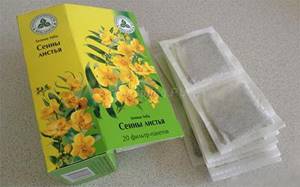
Alexandria leaf for weight loss has very good reviews, especially in cases where diets do not show the desired result, as well as if symptomatic constipation occurs. You just need to know the correct recipe for preparing a decoction or tincture. It is necessary to take the drug at regular intervals, usually 2 times a day. The dosage should be approximately half a glass.
How to store and grow a plant
If we learn more about the origin of the Alexandrian leaf and figure out what kind of plant it is, we will see that it came to Russian-speaking countries from warm countries. Wild Cassia angustifolia is found in arid places in Africa and Asia. In many eastern countries it is a very valuable plant, which is widely used in medicine and is grown in specially designated areas.
- In Russia and Ukraine, Alexandria leaf is popular as an annual plant. It can be grown in garden plots without frequent watering. They also create special artificial conditions for growing large quantities of this shrub.
- After collecting Alexandria leaves in August and September, they are dried and stored in paper or cardboard containers in dry places. They can be crushed before or before consumption.
- If bugs, cobwebs or mold appear in dried grass, the product is considered spoiled and unfit for consumption.
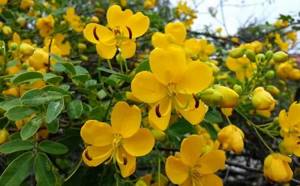
Cleansing the body
Alexandria leaf is recommended for use for weight loss. It is able to cleanse the intestines as much as possible, which will help normalize its functioning, improve motility and, in turn, significantly reduce the process of fat absorption. A positive result will be noticeable after about 2-3 days, but changes will be felt within 6-8 hours from the moment of using the product.
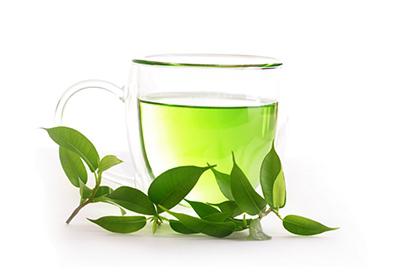
There is another name for the Alexandrian leaf - it is senna. This drug has a very gentle effect on the body. If we compare it with various other medications, then Alexandria leaf for weight loss has positive reviews in most cases, since it quite gently restores and shapes stool.
Senna, or Alexandria leaf
Senna, or Alexandria leaf, is one of the most common laxatives in our everyday life, which has been tested by time. The fact that it occupies about 10,000 hectares in India suggests that this plant is in demand all over the world.
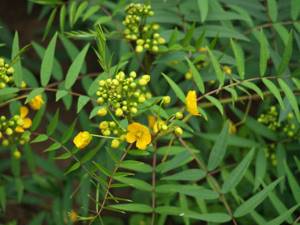
The first reports of its use date back to the 8th century, and during this period it was used by Arab doctors who believed that senna leaves and caraway seeds treated all diseases except death. Until the Middle Ages, senna was used little for its current purpose, but mainly for leprosy, infectious diseases, stomach and eye diseases.
Since the 16th century, it has been used primarily as a laxative. Paracelsus used senna leaves in combination with wormwood and green onions as a laxative. The well-known Count Saint Germain, an alchemist and rogue, used it as a universal remedy (Saint Germain tea) for all diseases at once.
Alexandrian senna (Senna alexandrina), or as it is commonly called in our country according to the old classification, Cassia acutifolia, was grown for a long time in the USSR in the territory of Southern Kazakhstan. Traditionally cultivated in Egypt and Sudan. Considering that cassia is a southern plant, most countries purchased it in Egypt and exported the raw materials through the port on the Mediterranean Sea - Alexandria, hence the name “Alexandria leaf”.
This species, as well as Senna angustifolia imported from India, belongs to the legume family, subfamily Caesalpiniaceae. In the wild, the plant is found in Africa, in the Middle Nile basin, in desert and semi-desert areas.
The genus Senna is rarely herbaceous, often shrubby, and sometimes woody plants with paired pinnate alternate leaves. Medicinal species are small subshrubs up to 1 m high (in cultivation up to 2 m). The root is a tap root, with few branches, going deep into the soil. The stems are erect, branched, with alternate compound, pair-pinnate leaves with 4-8 pairs of narrow, ovate-lanceolate, acute leaves. The flowers are slightly irregular, yellow, collected in axillary inflorescences.
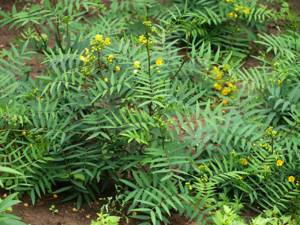
Cooking yourself at home
To prepare a healing infusion at home, you need to take one tablespoon of the plant, grind it very well, and then place the whole product in a bowl where one glass of boiling water has already been poured (the water must be boiled). This infusion should be left alone for about eight hours. After the specified time has passed, you need to strain the mixture through a fine sieve or cheesecloth.
There is another way. You need to take ¼ liter of boiling water and pour in about two tablespoons of raw material, then you need to heat this broth for about half an hour, but not in direct contact with gas, but through a water bath. Next, the prepared mixture must be cooled for approximately 35 to 45 minutes, then filtered well and squeezed out the raw materials. The amount of prepared infusion must be brought to the initial amount. The method of use is quite simple. You need to drink 0.5 glasses twice a day - morning and evening.
In order to treat diseases such as atherosclerosis, you need to prepare 15 grams of rose hips, several birch leaves, mint, carrots, burdock root and, of course, Alexandria leaf. All of the above ingredients must be crushed, then mixed and poured with one liter of boiling water. Leave the mixture for 1 hour. After time, it is necessary to consume half a glass of the decoction three times a day, preferably after meals.
In order to cure colitis, you need to prepare in advance in equal quantities Alexandria leaf, fennel fruits, caraway seeds, mint, St. John's wort, plantain leaves, chamomile flowers, immortelle flowers. After all the components have been collected, you need to mix them well, and then pour two tablespoons of the mixture into 0.5 liters of boiling water. Let the broth brew for about 35 minutes, then strain through a fine sieve or cheesecloth, which is folded several times. You need to consume 100 grams of the prepared decoction before meals.
Botanical description
Before us is a subshrub belonging to the legume family. It is a small spreading plant that in nature grows no more than 1 m in height, and when cultivated can reach 2 meters.
Senna has a taproot on which a small number of side roots are formed. The root system is quite long, which allows the plant to receive moisture at a considerable depth.
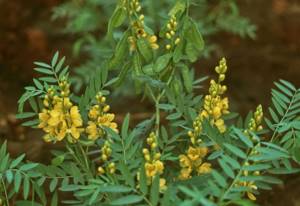
Since the plant is a legume, the fruit is a multi-seeded bean, which is about 5.5 cm long. It is colored brown.
Features of use
It is also recommended to alternate the Alexandrine leaf with any other means for losing body weight, so that there is no addiction. Moreover, it is necessary to remember that there must be moderation in everything, since if the dose is significantly increased, then many unpleasant consequences are likely to occur. A person may begin to develop intestinal dystrophy, or the lining of the stomach will be severely irritated.
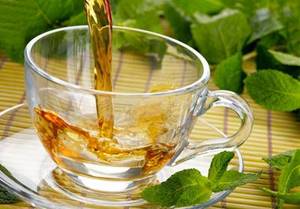
Before you start using the above product, no matter in what form, you must first consult with a qualified specialist in order to avoid unpleasant consequences.
